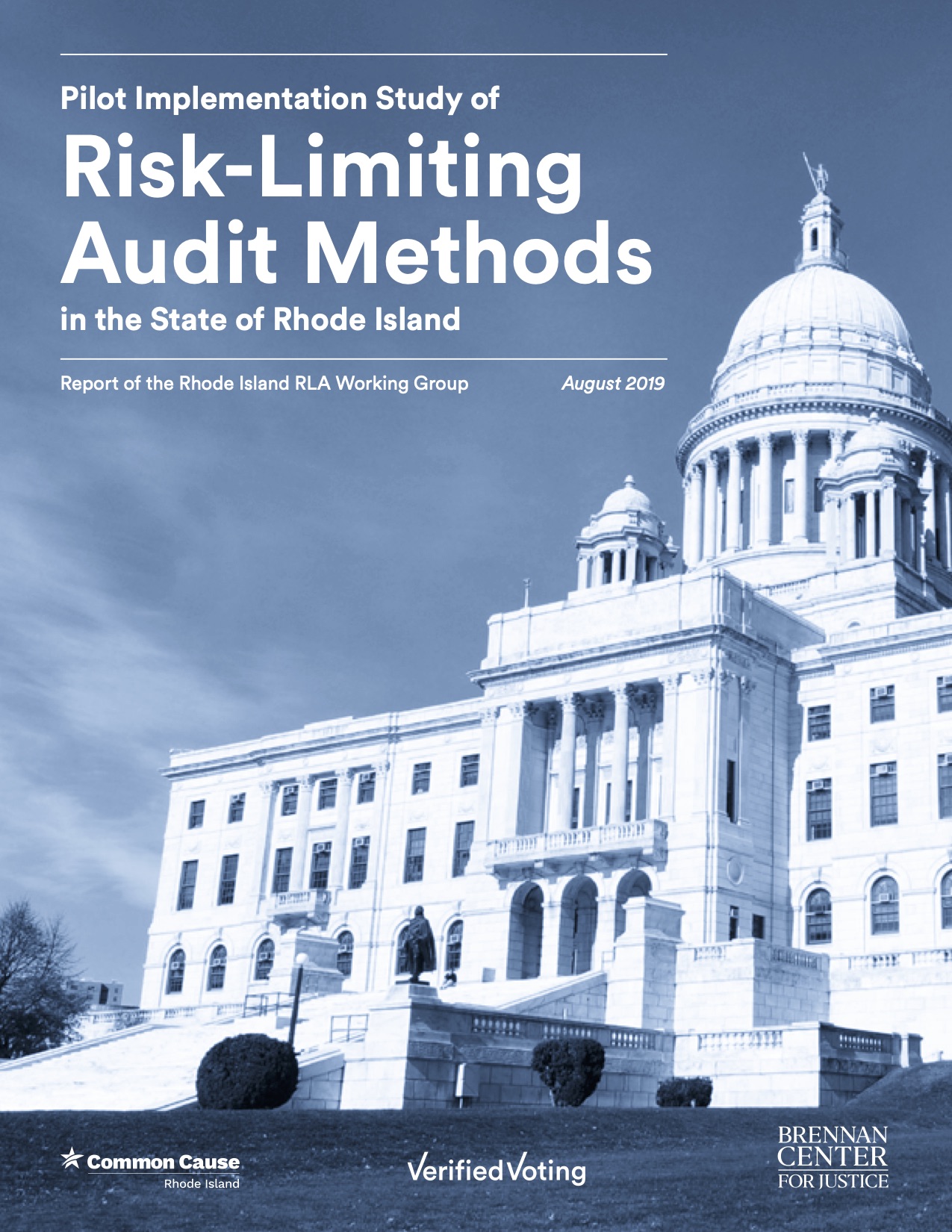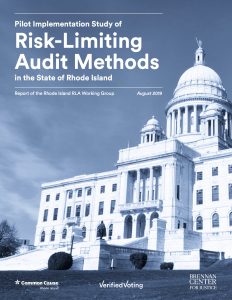
report
Pilot Implementation Study of Risk-Limiting Audit Methods in the State of Rhode Island
Date: September 4, 2019
Author: Rhode Island RLA Working Group
Issue: Post-Election Audit
Executive Summary
In October 2017, Rhode Island Governor Gina Raimondo signed into law a groundbreaking election security measure.
Now, state law requires Rhode Island election officials to conduct risk-limiting audits, the “gold standard” of post-election audits, beginning with the 2020 primary. A risk-limiting audit (“RLA”) is an innovative, efficient tool to test the accuracy of election outcomes. Instead of auditing a predetermined number of ballots, officials conducting an RLA audit enough ballots to find strong statistical evidence that outcomes are correct. The law, enacted in the aftermath of two critical events relating to the 2016 elections, stems from decades of advocacy aimed at increasing the efficiency, transparency, and verifiability of political contests in the state. Rhode Island is now the second state, joining trailblazing Colorado, to mandate use of this modern tool statewide.
Following the law’s enactment, a group of professionals with expertise in election security and election administration formed the Rhode Island Risk-Limiting Audit (“RIRLA”) Working Group. As its name suggests, the RIRLA Working Group was established to assess the conditions in Rhode Island to help the state as it prepares to implement the law. The RIRLA Working Group recommended – and Rhode Island officials agreed – that the state should conduct pilot RLAs in advance of the 2020 deadline. The Rhode Island Board of Elections chose January 2019 as the date for the pilots and, based on several factors, selected Bristol, Cranston, and Portsmouth, Rhode Island as participating municipalities.
Leading up to the pilots, the RIRLA Working Group had regular conference calls, meetings, and other correspondence to gain greater familiarity with Rhode Island’s election laws, practices, and voting equipment. In partnership with the state, the RIRLA Working Group set a goal to plan and develop a trio of pilot audits that would both meet the state’s needs and adhere to the Principles and Best Practices for Post-Election Tabulation Audits. Ultimately, the RIRLA Working Group drafted three separate audit protocols, step-by-step instructions to guide those who would conduct the RLAs over the course of two days.
On January 16 and 17, the Rhode Island Board of Elections and members of the RIRLA Working Group met in Providence, RI to conduct the pilot risk-limiting audits. In conducting three unique RLAs – a ballot-level comparison, a ballot polling, and a batch comparison audits – the partnership sought to:
• Familiarize election officials with RLAs and provide them some comfort with conducting them through a hands-on learning experience;
• Evaluate Rhode Island’s election facilities, equipment, and other resources to determine their adequacy for administering RLAs;
• Emulate the actual environment and real-world circumstances in which the RLAs would be conducted, including by having officials manage unanticipated scenarios that could arise;
• Time the various audit steps and compile the data to compare the relative efficiency of the separate audit approaches;
• Ascertain any gaps or deficiencies that might hinder the initial rollout and implementation of RLAs or the state’s ability to conduct them beyond 2020;
• Make a set of recommendations to help officials conduct RLAs pursuant to state law and best audit practices.
This report tells that story. It details how, through a collaborative effort, Rhode Island successfully conducted three pilot RLAs. It provides a general overview of RLAs, including the advantages and disadvantages of each method. The report describes the history of election administration in Rhode Island, which has led to the environment in which elections are conducted in the state today. It also lays out the essential components of the audits – their design, software tools, and presentation – and provides the results of the audits. Finally, the report describes some of the key lessons learned throughout the process, and it makes recommendations, specifically that Rhode Island pursue ballot-level comparison audits, so that state officials and the public move towards RLAs seamlessly and to improve the state’s experience with RLAs in the future.
This was a truly collaborative effort. It would not have been possible without countless hours of work from Miguel Nunez and Steve Taylor (Rhode Island Board of Elections); John Marion (Common Cause Rhode Island); Mark Lindeman and John McCarthy (Verified Voting); Wilfred Codrington III and Andrea Cordova (Brennan Center for Justice); Luther Weeks (Connecticut Voters Count); Ron Rivest, Mayuri Sridhar, and Zara Perumal (Massachusetts Institute of Technology); Suzanne Mello-Stark (Rhode Island College), independent volunteers Lynn Garland, Neal McBurnett, Tom Murphy, and many others who made the pilot audits and this report a success.
A host of recent events, including equipment malfunction, cyberthreats, maladministration, and human error, have undermined public confidence in American elections. Unfortunately, these types of occurrences are not likely to disappear. But the good news is that our officials can help, even in the face of constraints on their time and public resources. They can take steps both to decrease the number of incidents and to show that they are willing and able to address the problems as they arise. They can start by conducting RLAs, to assure the public that the reported winners of elections are the actual winners. Risk-limiting audits are an efficient, effective, and straightforward way to enhance public confidence in our elections that takes into account the realities of election administration. The success of the pilots in Rhode Island can and should serve as a model for what state and local officials across the country can accomplish, and how other individuals and organizations can provide valuable assistance. We hope to make that clear with this report.
